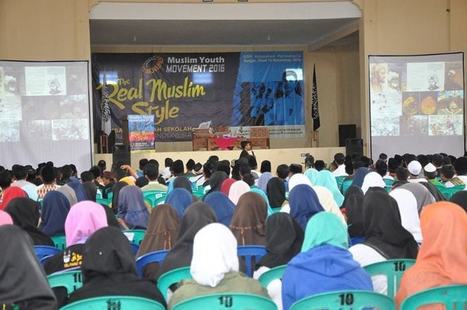Call to Akhlaq Between Truth and Illusion

A concept that circulates among the ulema who are enthusiastic about calling to Islam, summarized as follows: “There is no upliftment for individuals or societies except through akhlaq (etiquette).” They argue that if individuals possess these akhlaq, they will rise and progress, but if they lack them, they will decline and degrade.
They build upon this description of individuals and say: “If we rectify the individual, we will rectify society.”
The fundamental pillar for the upliftment of the individual and society is ethics. They derive evidence from the Quran and the Sunnah to confirm their claims. They refer to the verse in Surah Al-Qalam (Chapter 68, Verse 4):
“And indeed, you are of a great moral character” and other similar narrations. They also cite the saying of the Prophet Muhammad (peace be upon him): “I was sent to perfect good character.”
They argue that the primary objective of sending Messengers is to convey and teach Akhlaq. They consider Deen itself as proof of the importance of ethics.
What is the truth behind this statement? Is their argument valid regarding the reality of individuals and society? What is the status of Akhlaq in Islam? And where does it stand in Islamic legislation? These are questions that will be followed by answers, with the help of Allah (swt).
Ibn Manzur stated in “Lisan al-Arab”:
“The word ‘khulq’ (خلق) is derived from the root letters with a dammah and sukun, and it refers to religion, innate disposition, and character. In this linguistic sense, the words ‘khuluq’ and ‘akhlaq’ are mentioned in the Quran and the Sunnah without the Sharia giving them a specific legal meaning. Rather, they are used according to their linguistic connotation. For example, Allah, the Exalted, addresses His Prophet (peace be upon him) in Surah Al-Qalam (Chapter 68, Verse 4): ‘And indeed, you are of a great Khuluq.’
Scholars have differed in their interpretations of this verse, and there are two main opinions. The first opinion, which is the majority view held by Ibn Abbas, Mujahid, Abu Malik, As-Suddi, Ar-Rabi’ ibn Anas, Ad-Dahhak, Muqatil, and Ibn Zaid, is that it refers to the Deen of Islam, meaning: ‘Indeed, you are upon a great Deen.
Some scholars, including Ali and Ata, have suggested that it means ‘the etiquette/behaviour of the Quran.’ At-Tabari reconciled between the two opinions, stating that it means: ‘Indeed, O Muhammad, you are upon a great akhlaq,’ which is the akhlaq of the Quran.” This is what Ibn Manzur mentioned in “Lisan al-Arab” regarding the meaning of the words ‘khulq’ and ‘akhlaq’ in the Quran that what Allah taught his Prophet and that is Islam and the Shariah.
The majority of scholars of interpretation considered the first meaning as “Deen,” while some of them considered the second meaning as “innate disposition and character.” If we lean towards the first meaning, which is indicated by the context, it does not serve as evidence for what they claimed.
They intended to replace it with a different meaning. However, if we adopt the second meaning, which is the meaning they intended, it can be understood as our mother Aisha (may Allah be pleased with her) understood it when she said, “His character was the Quran.” This means that the Prophet Muhammad (saw) embodied the commands and intentions of the Quran, such as innate disposition and character. However, it does not serve as evidence for making individual etiquette and behaviour the foundation of individual and societal revival.
The saying of the Prophet Muhammad (saw): “I was sent only to perfect good character” fall within the linguistic connotation of this term. At-Tahawi mentioned in his book “Mushkil al-Athar” His statement, “And the meaning of that, according to us – and Allah knows best – is that Allah, the Exalted, sent him (Prophet Muhammad) to complete the Deen for people and revealed to him what falls under this meaning. It is mentioned in the verse:
‘This day I have perfected for you your religion’ (Quran 5:3).
Thus, his mission was to complete the Deen of people, which they had been practicing in part. This is in continuation of what his predecessors among the Prophets had conveyed, as Allah, the Exalted, said:
‘This day I have perfected for you your religion’ (Quran 5:3).
The completion (al-Ikmal) refers to perfecting the religion. And it is the meaning of his statement: ‘I was sent to perfect good character,’ meaning: to perfect the religions, which is Islam.
The meaning the Prophet (saw) sent only to teach Khuluq in the meaning of completing the Deen falls in line with the Hadith of the Prophet (saw) wherein he said “Verily, the example of me and the message that I have been sent with is like a beautiful structure. Its construction and beauty are complete except for the place of one brick. So, the people began to walk around it and admire it, but they wondered about the missing brick. He (the Prophet) said: ‘I am that brick, and I am the last of the Prophets.”
This hadith is narrated by Imam Bukhari.
Therefore, the erroneous understanding of the meaning of the term “al-akhlaq” (character) in these texts leads to the mistaken claim that the verses and the hadith imply that individual progress can only be achieved through personal character development. They justify this by stating that the mission of Prophet Muhammad (peace be upon him) was to perfect noble qualities of character (as they understand them), which they believe to be limited to specific attributes. However, this understanding is incorrect and does not align with the evidence provided by the verses and the hadith.
Hence, their argument is based on flawed reasoning. It is misguided to suggest that personal character development is the entirety of the Deen, as it contradicts the reality that the Deen encompasses beliefs, worship, transactions, and systems governing people’s affairs. These aspects are not solely related to character development, but rather Islam encompasses them all.
As for the reality of the claim that individual and societal progress is solely based on character development, specifically the qualities or attributes they attribute to it, this view is far from correct. Progress does not rely on partial ideas such as character alone; rather, it is based on a comprehensive idea that serves as a foundation for thinking about everything. This idea becomes the intellectual basis from which systems emerge. This is the Aqeedah (Creed) of Islam, which convinces the mind and heart and answers the fundamental questions about where humans came from, where humans go after death, and the relationship between the two and defining a purpose for the human in life.
This principle applies to specific ideas such as character development. Character alone is not suitable as a foundation for thinking about everything, nor does it have a system that stems from it. Therefore, it is only the comprehensive idea (the Islamic Aqeedah) that can serve as the basis for progress, whether it is for individuals or societies. This Aqeedah is the intellectual belief, that is, the belief that is reached through thought and reflection.
Furthermore, Humans do not have the ability to describe an action or pass judgment on it solely based on their mind. Therefore, the accurate description of actions is provided by the religious law (Sharia). In our context, ethics are the legal rulings that we are obliged to follow according to the dictates of the Sharia. It is not valid to consider akhlaq simply as praiseworthy attributes; rather, they are adhered to as legal rulings. The source of ethics in our context is revelation, which differs from the ethics of other religions and principles. Ethics are not universally the same among all peoples and nations, although there may be some commonalities among them in certain aspects.
As for the reality of human beings and society, humans have organic needs and instincts that drive them to fulfill them. As a result of the process of fulfillment, relationships emerge from them.
We can summarize these relationships in three categories:
- The relationship of a person with their Creator, which includes beliefs and worship.
- The relationship of a person with themselves, which includes ethics, personal traits, and appearance.
- The relationship of a person with others, which includes interactions and transactions.
These relationships encompass various aspects of human life, including beliefs, worship, ethics, personal grooming, interactions with others, and the consequences of actions.
Islam came to organize these relationships in order to achieve human progress and revival. From this perspective, we can derive the fundamental elements upon which an individual can thrive. These elements are ranked in order of importance:
- Beliefs (faith): Having a sound belief system and understanding of the principles of Islam.
- Worship: Engaging in acts of worship and fulfilling religious obligations.
- Interactions: Conducting transactions and interactions with others in accordance with Islamic principles.
- Ethics: Upholding high moral values and displaying virtuous behavior.
If any of these elements are lacking, individual progress and revival cannot be fully realized.
Through this, a person realizes that true progress and development are not achieved solely by focusing on ethics and good morals. Rather, they must also focus on their beliefs, performing proper worship, and engaging in good conduct. Comprehensive progress requires attention to all these interconnected aspects, as they work together to achieve the advancement and holistic development of the individual.
As for society, people have needs and instincts that drive them to fulfill their desires. Since individuals cannot independently fulfill their needs, they must establish relationships with others in the human community. This relationship needs to be permanent to ensure people’s stable coexistence within their communities.
This enduring relationship consists of shared ideas, harmonious emotions aligned with these ideas, and a system that preserves society’s ideas and emotions. From this description of societal reality, it becomes clear that society is not solely based on the individual but relies on collective ideas, emotions, and a system that safeguards the collective norms. The influence of ethics on societal reality is not its foundation but rather one of its components. The Islamic ethical guidelines established by religious law are considered obligatory commands and intentions that Muslims should adhere to during their journey through life.
Allah (swt) prohibits lying as it is considered a dishonorable act, but lying is permitted in the context of war as a legitimate ruling. Allah commands mercy towards believers and harshness towards disbelievers as commands not merely behavioral traits. Therefore, ethical judgments and rulings are not merely moral qualities, but legal judgments derived from religious law.
We as Muslims must work on our akhlaq meaning we should try our best to shape our behaviour according the the Qu’ran and Sunnah. However, we must realize in order to change society we must work for ideological change that changes people’s reference point for ideas, emotions and the common system they refer too. This was done by the Prophet (saw) by establishing the first Islamic State in Madinah. He (saw) criticized the fundamental intellectual basis of the Arab society and challenged its intellectual foundations. Hence limiting our work to fixing individual akhlaq contradicts the Prophetic way and becomes a barrier to reviving the Islamic nation. Hence, we need to work towards fundamental ideological change like the Prophet (saw) who came to change the Deen people are upon via reviving society with a new system.









